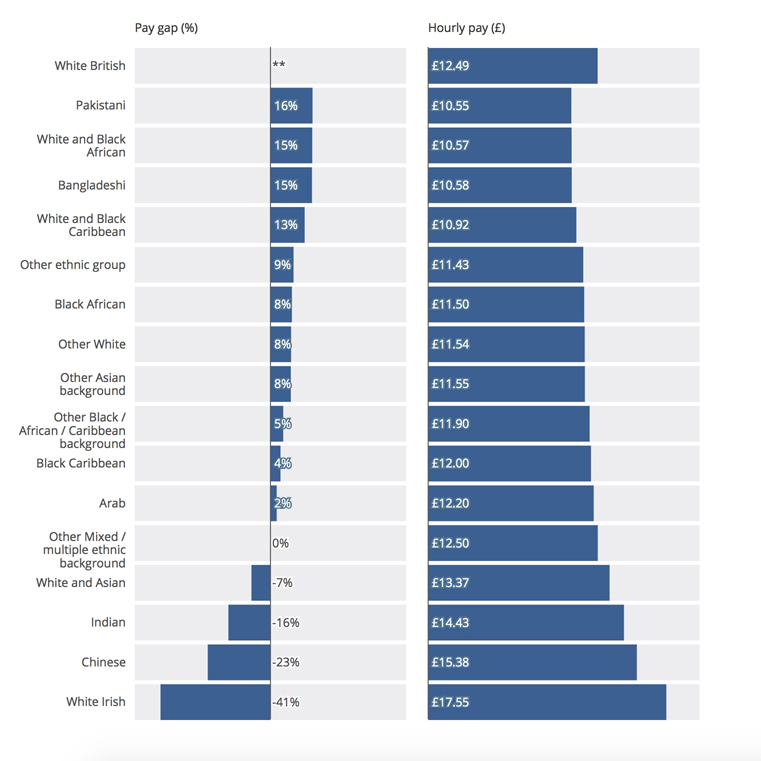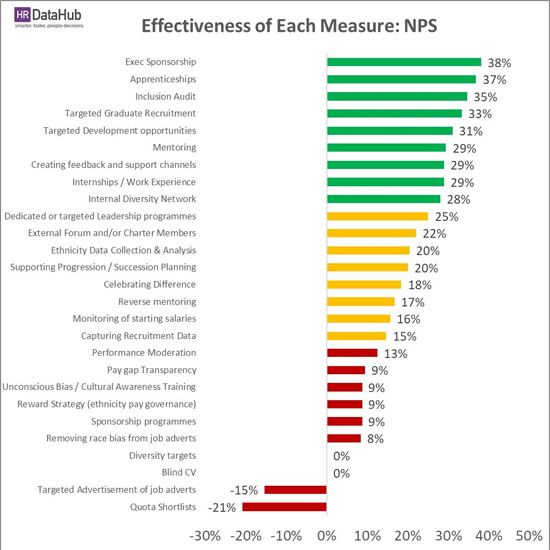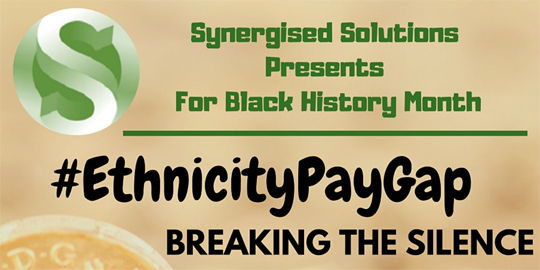Most minority ethnic groups continue to earn less than their White colleagues, according to the latest figures from the Office of National Statistics (ONS).
Its latest report reveals that UK’s ethnicity pay gap is highest for people in the 30+ age groups compared to those aged between 18-29. The pay gap between White employees and minority ethnic groups is also largest in London at 23.8%, and smallest in Wales at 1.4%.
Overall, however, the gap between these groups has narrowed to its smallest level since 2012 in England and Wales, notes ONS. In 2019, the median hourly pay for White employees was £12.40 per hour compared to £12.11 per hour for ethnic minority groups – a pay gap of 2.3%. The pay gap was at its largest in 2014 at 8.4%. This simple comparison between White and ethnic minority groups, however, masks a wide variety of experiences among different ethnic minorities.
ETHNICITY PAY GAPS
Although most minority ethnic groups earned less on average than White British people in 2019, there were some exceptions. People of Chinese, White Irish, White and Asian, and Indian ethnicities earned more than their White British counterparts between 2012 and 2019, reveals ONS data. That said, other ethnic groups including Bangladeshi, Pakistani, Black African and Arab, consistently earned less their White colleagues during the same period, as demonstrated in the chart below.

Source: ONS
ADDRESSING THE GAPS
The latests statistics confirm that “the Government now needs to address the ethnicity pay gap”, according to Dianne Greyson, Director of Equilibrium Mediation Consulting. A petition urging the Government to make ethnicity pay gap reporting mandatory received over 100,000 signatures. However, the matter has yet to be debated in parliament.
“We urgently need mandatory ethnicity pay gap reporting to be introduced,” stated Greyson. She established the #EthnicityPayGap campaign back in 2018 and has been campaigning ever since to get the ethnicity pay gap addressed. She also believes tough action against discriminatory employers and a comprehensive plan to address the structural causes of unequal treatment in society are a must. However, Greyson advises employers to make a start and close the gaps and not to wait for mandatory legislation. “Companies need to explore their ethnicity pay gaps and why they exist. They also need to engage Black, Asian and Minority ethnic staff, and let them know they are doing their best,” she added.
Earlier this year, the CBI urged companies with more than 250 employees to voluntarily publish their ethnicity pay gap data in the same way they already do for their gender pay gap reports. It urged firms not to wait for the Government to make ethnicity pay gap reporting mandatory to publish data on their ethnicity gaps. To help companies voluntarily publish their ethnicity pay gap data and assist in closing the gaps, CBI has created a guide with Eversheds Sutherland, as reported.
Like the CBI, many other HR experts like HR Data Hub, also believe it’s just a matter of time before ethnicity pay gap reporting becomes mandatory. It’s also advising firms to start collating ethnicity data and introduce measures that will help to close the pay gaps sooner, than later.
SUCCESSFUL MEASURES
In fact, HR Data Hub’s latest survey has already identified some of the most successful measures being used by firms to close ethnicity pay gaps ahead of legislation. The chart below shows the success rate for each measure that firms have put in place to close the ethnicity pay gap.

Although the survey (carried out in partnership with d&i Leaders) is still running, initial results reveal the most effective measures for closing ethnicity pay gaps. “Executive support is the most effective measure, along with making sure that talent pipelines are inclusive through apprenticeships and graduate recruitment,” reveals HR Data Hub’s CEO & Founder, David Whitfield. “Quota shortlists are always controversial and seen as simply not working for the respondents. Other issues to note is the low placement of bias training and diversity targets.”
BREAKING THE SILENCE
Movements like Black Lives Matter and Black History Month are also urging companies to take steps to create a more just society, by closing pay gaps and improve leadership representation at the top of their organisations. “It’s time to break the silence on the ethnicity pay gap,” stressed Synergised Solutions. So it has planned an event to discuss the topic in honour of Black History Month on Friday 23rd October.
Entitled #EthnicityPayGap – Breaking the Silence Removing the Ignorance, the online debate will be hosted by millennial ambassador for the #EthinicityPayGap campaign, Nicole Peterson. The event aims “to educate and empower those who want to put an end to one of the many forms of institutional racism”, commented Peterson. Click here for more information.









































